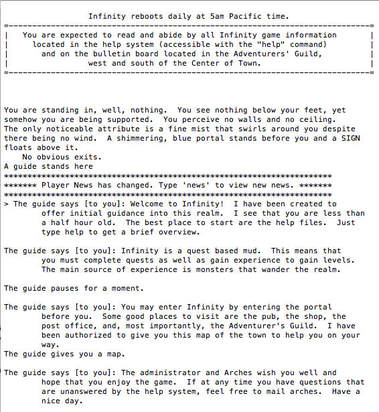 In the 1990s, I played an online, text-based, role-playing game called Infinity. The fantasy element intrigued me, and I liked pretending to be someone else. Infinity is a MUD, or multi-user domain, although other MUDders (MUD players) often refer to the “D” as dimension or dungeon. Just for kicks, I logged on to Infinity last week. The character I created in 1994 is gone, but I was happy to see that, after more than two decades, my favorite online fantasy world still exists. The opening dialogue is the same and sets the stage for adventure: You are standing in, well, nothing. You see nothing below your feet, yet somehow you are being supported. You perceive no walls and no ceiling. The only noticeable attribute is a fine mist that swirls around you despite there being no wind. A shimmering, blue portal stands before you and a sign floats above it. Cool, right? Okay, maybe not. But if this is indeed a “stage,” then Infinity is a theatrical production just as much as it is a text-based game. It’s like reading a never-ending, loosely-scripted book in which you’re the main character. Opening this portal is quickly followed by a series of choices – where to go, what to do, and how to describe your character, including name, gender and other descriptors. This last part – character development – is a very important feature in MUD play. Pseudonymity, or the process of creating fake identities for the purpose of living as someone else, is the hallmark of MUD play. “I like being somebody else, or in my case, something else, online,” a player (who asked not to be identified) told me in an online chat. “I know it’s not totally anonymous. If the NSA wants to find me, they probably could.” She went on to say that being this creature online gives her a break from “normal” life. “It’s either this or drugs,” she said with a smiley face. Infinity limits play to about 70 MUDders at a time, but it boasts a diverse group of players from all over the world, including Australia, Brazil, Canada, Germany, Italy, Japan, and the United States. After several months of play, my “real life” friend received an invitation to an Infinity “gathering” in Boston. It seemed odd that a group of people who lived online would want to meet face-to-face. But “Okay,” I thought. “I like a good party.” Our gathering showed me what I expected. The personalities I saw on display in real life were a vast departure from the personas I interacted with online. Still, I believe this kind of “play” is a good thing at any age. Escape from our everyday lives for a few moments in a safe environment is something we all need, and maybe even more so today than we did 20 years ago.
0 Comments
Your comment will be posted after it is approved.
Leave a Reply. |
AuthorDr. Adam C. Earnheardt is special assistant to the provost and professor of communication in the department of communication at Youngstown State University in Youngstown, OH, USA where he also directs the graduate program in professional communication. He researches and writes on a variety of topics including communication technologies, relationships, and sports (with an emphasis on fandom). His work has appeared in Mahoning Matters as well as The Vindicator and Tribune-Chronicle newspapers. CategoriesArchives
July 2023
|
 RSS Feed
RSS Feed